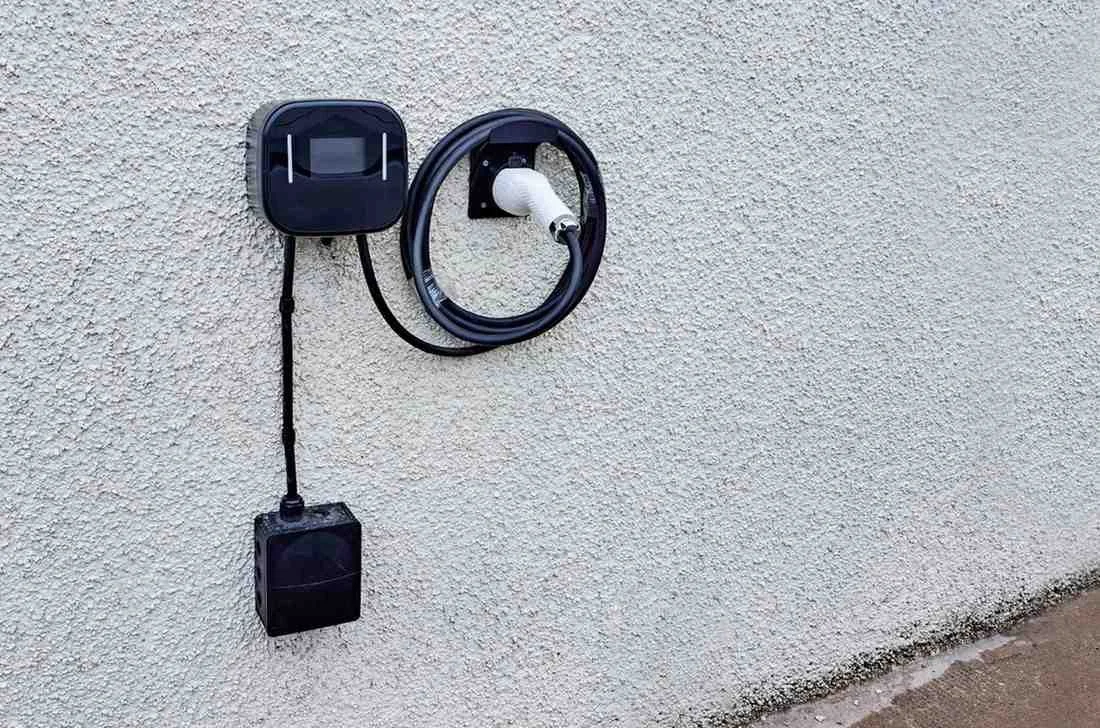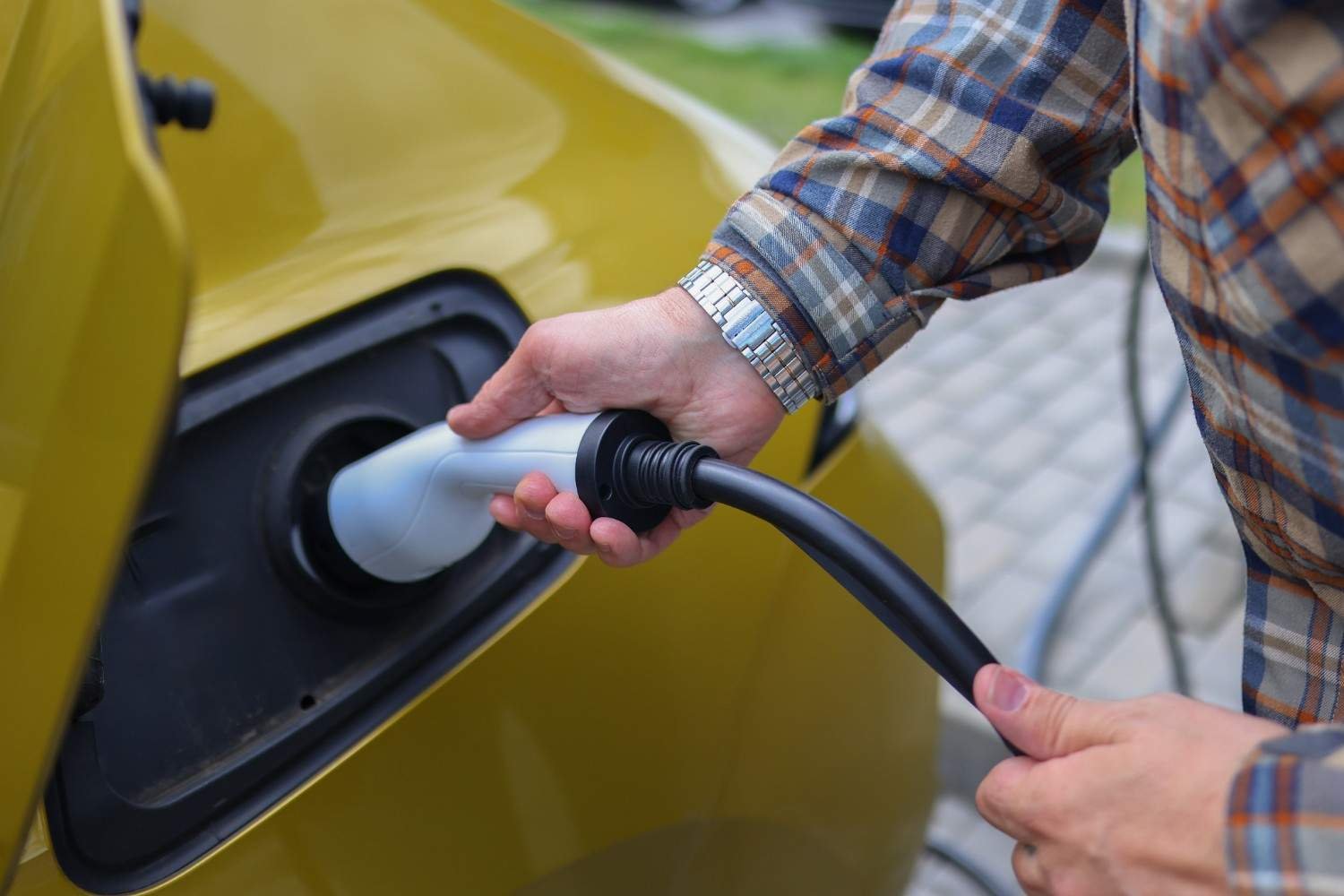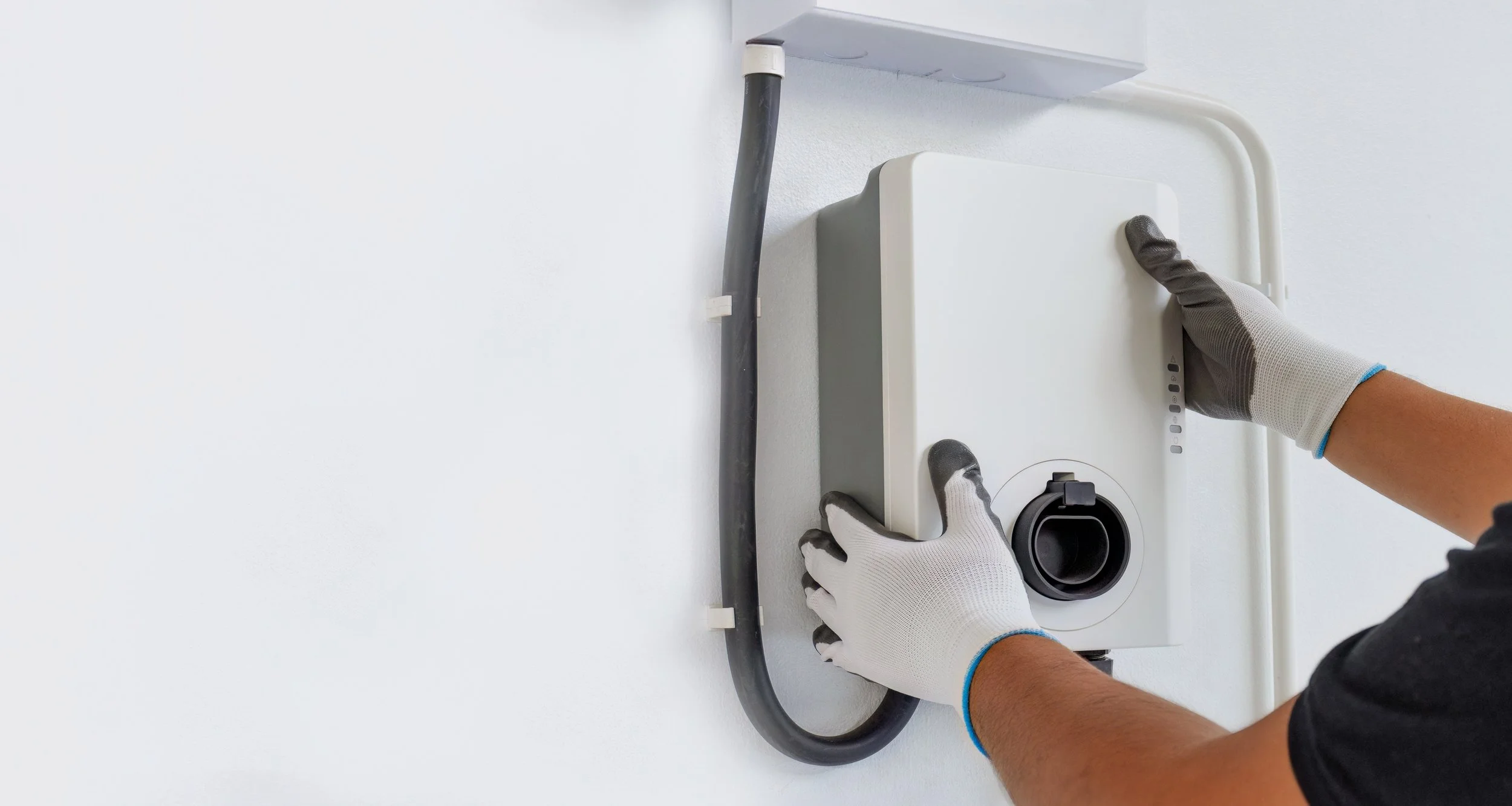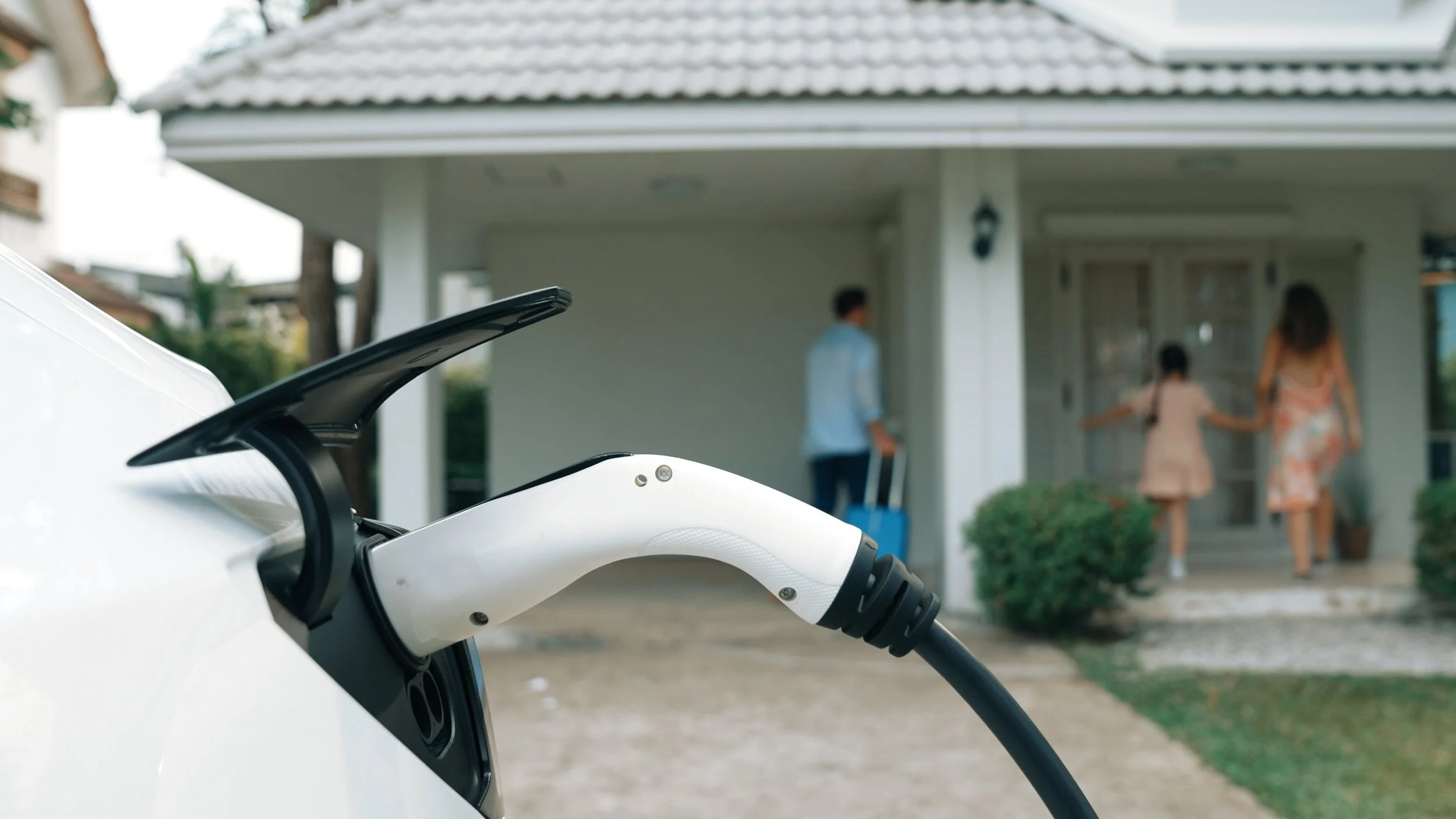How Much Does EV Charger Installation Cost in 2026?
Image source: Shutterstock
Are you thinking about switching to an electric car through a salary sacrifice scheme, or already driving an EV and finally ready to sort out your home charging? One of the biggest practical questions you’ll have is simple: how much does it cost to install an EV charger at home in 2026?
With electric vehicle ownership growing fast in the UK, home charging has gone from “nice-to-have” to essential. Public charging is improving (there are now over 86,000 public charging devices across the UK), but charging where you park overnight is still the cheapest and most convenient option.
This guide breaks down EV charger installation costs in 2026 - equipment prices, labour, complexity factors, grants, and the smartest ways to cut your bill. We’ll also show you how The Electric Car Scheme can bundle your home charger installation costs and ongoing charging through salary sacrifice, saving you 20–50% overall.
EV Charger Installation Cost Summary 2026
Before we dive into the details, here’s a quick 2026 snapshot of home EV charger installation costs in the UK.
What Are The Typical EV Charger Installation Prices In The UK?
Standard Assumptions:
Domestic single-phase supply (typical UK home)
Wall-mounted charger
Up to 10m cable run
No consumer unit replacement required
OZEV-approved installer
| Charger Type | Equipment Only | Standard Installation | With Grant | Salary Sacrifice Bundle |
|---|---|---|---|---|
| 3kW Charger | £250-£500 | £700-£900 | £350-£550 | £490-£630 (30% saving) |
| 7kW Charger (Standard) | £450-£800 | £800-£1,200 | £450-£850 | £560-£840 (30% saving) |
| 7kW Smart Charger | £550-£900 | £900-£1,300 | £550-£950 | £630-£910 (30% saving) |
| 22kW Charger | £700-£1,200 | £1,200-£2,200 | £850-£1,850 | N/A (requires 3-phase) |
*Salary sacrifice examples assume costs bundled through The Electric Car Scheme with around 30% effective saving for a higher-rate taxpayer. Actual savings depend on your tax band and employer scheme.
Average Home Charger Installation Costs For 2026
The most common setup in 2026 is a 7kW smart home charger on a standard domestic supply.
Average total cost (equipment + installation): ~£1,110
With available grants (where eligible): ~£760 after a typical £350 EV Chargepoint Grant.
Through The Electric Car Scheme (salary sacrifice): effective net cost from ~£777 (around a 30% saving on the £1,110 headline price).
What’s Usually Included In a “Standard Installation”?
Most electric vehicle charger installation quotes for a standard 7kW smart charger will cover:
Charger unit (tethered or untethered)
Wall mounting and fixings
Up to 10m of cabling from your consumer unit
Connection to your consumer unit with appropriate protection
Testing, commissioning, and building regs compliance
Digital certification
Set up of smart features and basic app walkthrough
2–3 year product warranty (3 years is common; some premium brands offer 5+)
What’s Not Usually Included (Potential Extras)
You may see these listed as additional line items on your electric vehicle charger installation quote:
Groundworks (trenching or going under a driveway): £200–£500
Consumer unit upgrade/replacement: £300–£600
Main supply/capacity upgrades: £500–£2,000 (rare for modern homes)
Three-phase upgrade (for 11–22kW charging): £2,000–£5,000+
Extra cable length beyond 10m: £10–£20 per metre
Image source: Shutterstock
We’ll unpack all these below so you can properly compare home EV charging installation prices.
Understanding Installation Cost Components
Wondering why one installer quotes £850 and another £1,600 for “the same” EV charger fitting cost? Let’s break down the main components.
How Much Does An EV Charger Cost?
We’ve taken a look at the different types of EV chargers and their average costs.
3kW Chargers (£250–£500)
Adds roughly 8–15 miles of range per hour
Fine for very low mileage drivers or those happy to charge for long periods
Less common now as most UK drivers prefer faster 7kW units
Examples: entry-level units from Project EV or Rolec
7kW Chargers (£450–£800)
This is the UK standard for home charger installation and suits most households:
Adds around 25–30 miles of range per hour
Works on single-phase electricity (what most UK homes have)
Charges most EVs from empty to full overnight
Most common choice in our experience and across the market
Typical ranges:
Budget options (£450–£550 equipment only): Ideal for drivers who prefer a straightforward and functional solution.
Mid-range (£600–£700): Better apps, slicker design, more reliable smart features.
Premium (£700–£800): Strong apps, better build quality, integrations with tariffs and solar.
7kW Smart chargers (£550–£900)
Smart chargers cost ~£100–£300 more than basic 7kW chargers but can more than pay for themselves:
Core smart features usually include:
Scheduled charging during off-peak hours
Automatic cheap-rate charging with compatible EV tariffs
Energy-monitoring dashboards
App control for starting/stopping charges remotely
Load balancing to avoid tripping your main fuse
Solar integration (for compatible models)
22kW chargers (£700–£1,200)
Require three-phase electricity, which most UK homes don’t have
Typically seen in workplaces or apartments, not in normal houses
Hardware isn’t dramatically more expensive, but:
The three-phase upgrade can add £2,000–£5,000+
You’ll need approval from your DNO (Distribution Network Operator) N&P Group
For most homes, a 22kW charger isn’t worth the extra wallbox installation cost. A 7kW smart charger offers all the speed you need for overnight charging.
What Are Some Recommended EV Smart Charger Brands?
Ohme Home Pro: Excellent tariff integration with dynamic EV tariffs
Wallbox Pulsar Plus. Compact, premium finish
Zappi: Great if you have (or plan) solar panels
Smart Home Charge recommended units: Solid value and support
Labour And Standard Installation Costs
A big chunk of your EV charger fitting cost is labour and associated materials.
Standard Installation (£300–£500)
Most home charger installation costs in the UK include:
2–3 hours of onsite work
Up to 10 metres of surface-mounted cable
Drilling a single wall
Connection to your consumer unit with a new 32A circuit
All necessary safety checks and certification
Image source: Shutterstock
Typical labour rates:
OZEV-approved EV specialists: £50–£80 per hour
General electricians: £40–£60 per hour
We strongly recommend using an OZEV-approved installer for safety, insurance and grant eligibility (more on this later).
Regional Variations
Location does matter:
London & South East: typically 10–15% above the national average
Northern England: often 5–10% below
Scotland & Wales (non-remote): similar to or slightly below the UK average
Remote and rural areas: may attract travel surcharges (£50–£150)
Are There Any Factors That Can Influence The Cost Of Charger Installation
Two homes on the same street can have very different electric car charging point installation costs. Here’s what tends to push prices up.
Cable Distance
Standard packages usually assume around 10m of cabling.
Beyond this, expect:
£10–£20 per extra metre
A 20m run might add £100–£200
A 30m run might add £200–£400
Longer runs sometimes require thicker cabling, which is more expensive and trickier to install.
Groundworks
If your installer needs to get cable under a path or driveway:
Basic trenching under paving: £200–£300
Cutting and reinstating tarmac or block paving: £300–£500
Some installers handle this end-to-end; others may suggest using a local contractor. This can be one of the biggest swing factors in home EV charging installation price.
Consumer Unit (Fuse Box) Condition
Modern consumer unit with spare capacity: often no extra cost
Older fuse box or no spare ways available:
Consumer unit replacement: £300–£600
Includes modern RCD protection, labelling and testing
Where needed, this upgrade improves your overall electrical safety, as well as enabling EV charging.
Electrical Capacity and DNO Involvement
Your installer will check:
Main fuse rating (60A vs 80A vs 100A)
Whether your supply can comfortably handle a 7kW charger
In some cases, especially older properties with heavy loads (electric showers, hot tubs, etc.), your installer may need to:
Ask your DNO to upgrade the main fuse or service head
Potentially reinforce the supply (rare, but possible)
These works can add £500-£2,000, but for most modern homes, a standard 7kW installation is fine.
Three-Phase Upgrades (for 11–22kW charging)
If you really want 11–22kW charging at home, you’re looking at:
DNO works: typically £1,000–£3,000
Internal electrical works and new distribution board: £1,000–£2,000
Total three-phase upgrade cost: £2,000–£5,000+
Given that a 7kW charger can fully charge most EVs overnight, this level of upgrade is rarely necessary for domestic properties. Read our guide to fast charging at home, designed to help you understand if you actually need fast charging.
Mounting Surface
Brick or block walls: usually included as standard
Timber cladding: may need specialist fixings – +£50–£100
Metal or reinforced concrete: more challenging – +£100–£200
Freestanding post/pedestal: typically +£200–£400
What EV Home Installation Grant Reductions Are Available in 2026?
Image source: Shutterstock
The historic Electric Vehicle Homecharge Scheme (EVHS) has ended for most homeowners and has been replaced by the EV Chargepoint Grant.
Key Points For 2026:
EV Chargepoint Grant (renters & flat owners):
Up to 75% of the cost, capped at £350 per socket
You must have off-street parking or an approved cross-pavement solution
Grants for landlords:
Up to £350 per socket and separate infrastructure grants, often up to £30,000 per building for multi-let sites
Local authority schemes:
Some councils run additional local top-ups
Energy supplier offers:
Certain tariffs come with discounted or subsidised home charger installation.
What Can I Expect During My EV Charge Point Installation?
Not sure what actually happens on installation day? Here’s how most home EV charging installations run.
Pre-Installation Survey
Most reputable installers will carry out a short survey, either:
Remotely (photos, videos, a quick questionnaire), or
In person (for more complex properties)
They’ll Typically Check:
Main fuse rating - 60A is workable, 80–100A ideal
Consumer unit condition and available space
Distance and route from meter/consumer unit to charger location
Wall construction and mounting options
Earthing and bonding arrangements
Wi-Fi strength at the planned charger location (important for smart chargers)
Any obvious need for groundworks or upgrades
From this, they’ll provide a detailed electric vehicle charger installation quote. This will cost between £50 and £100 and is often refundable
Installation Day (Usually 2–4 Hours)
A standard 7kW smart charger installation usually follows this pattern:
Step 1: Consumer Unit Work (30–60 Minutes)
Isolate the power safely
Add a dedicated 32A MCB and RCD/RCBO if required
Label the new circuit
Perform initial safety checks
Step 2: Cable routing (60–120 Minutes)
Drill through external walls if needed
Run cable neatly along walls (often in trunking or conduit)
Carry out any agreed groundworks
Clip and secure cable for long-term durability
Step 3: Mounting and Connecting The Charger (30–45 Minutes)
Fix the backplate securely
Mount and connect the unit
Seal any external holes for weather protection
Tidy the cable management
Step 4: Testing, Certification and Setup (30–45 Minutes)
Perform full electrical safety tests
Register the installation
Provide you with digital or printed certificates
Set up the charger app, pair it to Wi-Fi, and show you the basics
If you’d like a primer before the installer arrives, check out our beginner’s guide to EV charging - it’s a great place to start.
How To Reduce EV Charger Installation Costs
There are several ways to bring your home charger installation cost in the UK down without cutting corners.
The Charge Scheme: The Biggest Savings
The Charge Scheme (part of The Electric Car Scheme) lets you:
Bundle your home EV charger installation with your electric car lease
Pay via salary sacrifice, so costs come out of your gross salary
Save 20–50% on the charger, installation and even your ongoing charging
In the 2025/26 tax year, Benefit-in-Kind (BiK) for electric vehicles is 4% from April 2026, which keeps EVs extremely tax-efficient compared with petrol, diesel or even hybrids. Because the cost is taken before tax and National Insurance:
A higher-rate taxpayer can effectively save around 30–40%
A basic-rate taxpayer can still save 20–30%
Example: 7kW Smart Charger Installation Via Salary Sacrifice
Standard upfront cost: £1,100
Through salary sacrifice (40% taxpayer): ~£770 net
Saving: ~£330 (around 30% off your EV charger fitting cost)
Now add charging costs:
Suppose your annual home charging cost on a standard tariff would be ~£1,000
On an EV tariff and paid via salary sacrifice with The Charge Scheme card, your effective annual cost might fall to ~£600
That’s another £400 saved on energy in the first year alone
Combined First-Year Impact:
£330 saved on installation
£400 saved on charging
Total saving: £730+
Traditional Ways To Reduce Installation Costs
Not using salary sacrifice? There’s still plenty you can do.
Choose The Right Charger Type
For most people, 7kW is perfect - upgrading your whole house to three-phase just to rush charging usually isn’t worth it.
Smart chargers cost more but let you access cheap off-peak EV tariffs, which can slash your running costs (we’ll show you how in a moment).
Tethered (cable attached): more convenient day-to-day
Untethered (socket only): tidier and more flexible if you change cars a lot
Optimise The Installation Location
Place the charger as close as possible to your consumer unit
Avoid routing cable around the entire house if you can
Try to avoid crossing driveways or major paths (this is where groundworks costs kick in)
Make sure there is good Wi-Fi coverage – or plan for a Wi-Fi extender (£30–£80) if you’re adding a smart charger
Get Multiple Quotes
Always compare at least three itemised quotes from OZEV-approved installers:
Check the included cable length
Check if consumer unit work is included or separate
Look at the labour vs materials breakdown
Check warranty terms for both the kit and workmanship
Reviews on Trustpilot, Google and platforms like Checkatrade can be useful signals.
Bundle with other electrical work
Already planning:
A consumer unit upgrade
A kitchen refit with new circuits
A loft conversion or extension
It may be cheaper to combine EV charger installation with other work - you’ll pay for one call-out, and the electrician can plan everything together.
Check all available grants and schemes
EV Chargepoint Grant (renters/flat owners): up to £350 off
Landlord & infrastructure grants for multi-unit buildings
Workplace Charging Scheme – your employer may help fund charger installation at work
Local authority/housing association support, where available
Off-Peak Tariffs: Where Smart Chargers Shine
Image source: Shutterstock
Here’s where smart chargers can genuinely pay for themselves.
Without a smart charger on a standard tariff:
Standard domestic tariff: ~30p/kWh (illustrative)
60kWh charge: £18
52 full charges per year (roughly weekly for many drivers): £18 × 52 = £936
With a smart charger and a dedicated EV tariff:
Off-peak EV rate: ~7.5p/kWh (illustrative; exact rates vary)
60kWh charge: £4.50
52 charges per year: £4.50 × 52 = £234
Annual saving: ~£702
If your smart charger costs £150–£200 more than a basic unit, you can effectively pay back the premium in just a couple of months of off-peak charging.
Legal & Permission Requirements
Do you need permission before you install a home EV charger? In many cases, no - but it depends on your situation.
Homeowners
For most freehold homeowners:
Planning permission is not usually required if:
The charger is wall-mounted
It’s under a certain size and not overly prominent
Your property is not listed
You’re not in a very tightly controlled conservation area
You may need planning consent if:
Your property is listed
You’re in a conservation area, and the charger is visible from the highway
You’re installing a freestanding charging post instead of a wall unit
Your mortgage provider usually doesn’t need to be informed - it’s classed as a home improvement - but it’s always worth a quick check of your terms.
Renters
You must obtain written permission from your landlord
It’s helpful to highlight:
The added appeal and value to the property
That professional installation is safe and certified
Some landlords may contribute, especially where demand for EV-ready rentals is growing
The EV Chargepoint Grant is available to renters with suitable parking, which may make the conversation easier.
Leaseholders
If you’re a leaseholder (e.g. in a flat):
Check your lease - you may need permission from:
The freeholder
The management company or residents’ association
Installation may involve communal areas or shared electrical infrastructure
It’s important to clarify who pays for:
The charger
Any shared works or upgrades
Ongoing maintenance
Flat / apartment residents
If you live in a flat:
Expect a slightly more complex path – more stakeholders, shared spaces, and capacity checks
The EV Chargepoint Grant for flats can cover up to £350 or 75% of costs per socket, which helps.
Post-Installation Costs
Once your home charger installation cost is behind you, what will you pay to run and maintain it?
Charger Servicing And Maintenance
Many chargers are maintenance-free beyond basic visual checks
Some providers offer annual service plans:
£50–£120 per year
Includes checks on fixings, cables and protective devices
Can extend or support the warranty
Electricity Costs
Your monthly cost depends on:
Your annual mileage
Your vehicle efficiency (miles per kWh)
Your tariff (standard vs EV/off-peak)
Illustrative monthly costs (for around 10,000 miles/year):
| Driving Profile | Monthly Miles | Standard Tariff | EV Tariff | The Charge Scheme Savings |
|---|---|---|---|---|
| Low user | £500 | £25 | £10 | £7 (30% off) |
| Average user | £833 | £50 | £20 | £14 (30% off) |
| High user | 1,250 | £75 | £30 | £21 (30% off) |
These are example figures, but they show how much tariff choice and salary sacrifice can affect long-term running costs.
Insurance
You should inform your home insurer that you’ve installed an EV charger
Proper installation by an OZEV-approved installer and valid certification help avoid issues
For most households, this doesn’t significantly increase premiums
Is Home Charging Installation Worth It?
In almost every case, yes – especially when you combine home charging with a smart EV tariff and, ideally, The Charge Scheme
Payback vs Public Charging
Let’s take:
£1,100 7kW smart charger installation
EV tariff home charging at ~15p/kWh average (mix of peak/off-peak)
Public rapid charging costs around 65p/kWh on average in the UK
Image source: Shutterstock
If you drive around 10,000 miles per year, you might see:
Rapid public charging only: potentially £100+/month
Difference: around £60–£70 per month. Payback on your £1,100 installation: roughly 16–18 months.
Payback Vs Petrol
If you’re switching from a petrol car doing ~40mpg:
Petrol for 10,000 miles can easily cost £1,600+ per year at current fuel prices
The equivalent EV electricity cost can be closer to £400–£600 on the right tariff
That’s a difference of £80–£100+ per month, so your charger can effectively pay for itself in around a year.
With The Electric Car Scheme
Using salary sacrifice via The Electric Car Scheme:
Charger installation cost after tax relief: ~£770 instead of £1,100
Home charging paid via salary sacrifice: further reduced effective cost
Public charging: discounted when using The Charge Scheme card
Realistically, you could see a 7–10 month payback period and then enjoy ongoing savings.
On top of that, you get:
The convenience of plugging in at home and never needing to detour for fuel
A potential boost to property appeal
Cleaner motoring and reduced emissions
Finding Quality Installation Service
Choosing the right installer is just as important as choosing the right charger.
Essential qualifications
Look for installers who are:
OZEV-approved (they appear on the official government register)
Registered with a competent person scheme, such as:
Holding adequate public liability insurance
Familiar with your chosen charger brand and able to honour warranties
Red Flags To Watch Out For
Be cautious if you see:
Quotes that are much lower than others without a clear reason
Installers who are not OZEV-approved
Pressure tactics to “sign today”
Cash-only payment with no paperwork
No written quote or no mention of certification
How To Get A Solid Quote For Your EV Charger Installation
A good electric vehicle charger installation quote should clearly show:
Charger model and spec
What’s included in the standard installation
Any extra costs for:
Long cable runs
Groundworks
Consumer unit upgrades
Labour and materials breakdown
Warranty on both equipment and workmanship
Payment terms and timelines
Common EV Charger Installation FAQs (2026)
Can I Install An EV Charger Myself?
No. DIY EV charger installation is not safe or legal.
It can breach Part P of the Building Regulations
It will invalidate warranties on the charger
Your home insurance may refuse claims arising from faults
You risk serious safety issues for you and future occupants
Always use a qualified, OZEV-approved electrician.
Can a Normal Electrician Install An EV Charger?
A general electrician may be technically capable, but:
They may not be OZEV-approved, so you could miss out on grants
They may have less experience with EV-specific requirements (load management, DNO notifications, smart config)
Where possible, choose a specialist EV installer.
How Long Does EV Charger Installation Take?
The typical time for a standard installation is 2–3 hours. For more complex jobs (long cable runs, groundworks, consumer unit upgrades), it can take half a day or, occasionally, a full day
Do I Need A Three-Phase Electricity For An EV Charger?
No. Most UK homes happily run a 7kW charger on single-phase power, which is more than enough to charge overnight.
You only need a three-phase charger if you:
Want 11–22kW home charging, and
Are prepared to spend £2,000–£5,000+ upgrading your supply
For most households, this isn’t necessary.
What If I Move House?
In most cases:
The charger is treated as part of the property and stays put
It can enhance saleability if the buyer also wants an EV
Some installers and lease providers offer charger relocation services if you want to take it with you. If you’ve used salary sacrifice through The Electric Car Scheme, you own the charger, so you can discuss moving it with your installer.
Can I Charge An EV Without a Home Charger?
Yes, but it’s usually slower or less convenient:
Public charging network: now over 86,000 public EV chargepoints in the UK
Workplace charging: often subsidised or free
Three-pin plug charging: possible but very slow (often 8–10 hours just for ~30 miles) and not ideal for regular use
Do I Need Planning Permission To Install An EV Charger?
Usually not, as long as:
It’s a wall-mounted charger within your property boundary
The unit is not unusually large or visually intrusive
Your home is not listed and is not subject to specific conservation rules
Check with your local planning authority if you:
Live in a listed building
Are in a conservation area
Want to install a freestanding charging post visible from the street
Will Installing An EV Charger Affect My Home Insurance?
You should tell your insurer when you install a charger, but:
Properly installed chargers rarely cause premium increases
Using an OZEV-approved installer and keeping your certificates helps avoid any issues if you claim later
What Warranty Should I Expect on a Home Charger?
Typical warranties:
Equipment: at least 3 years, with some premium brands offering 5–7 years
Installation workmanship: usually 1–2 years
Always check the small print in your quote and warranty documents.
Do Smart Chargers Need Wi-Fi?
For the full feature set, yes:
Wi-Fi (or sometimes 4G) is needed for:
Remote control
Smart scheduling
Over-the-air updates
Tariff integration
However, basic charging usually continues even if Wi-Fi drops. If your Wi-Fi signal is weak at the installation point, a Wi-Fi extender (£30–£80) is a simple fix.
Making Your Installation Decision
Image source: Shutterstock
By now, you should have a clear view of EV charger installation costs in the UK for 2026 and how to keep them under control.
Key Takeaways
A standard 7kW smart charger installation typically costs £800–£1,200
The average all-in cost in 2026 is around £1,110
Eligible households can cut this to around £760 with the EV Chargepoint Grant
With The Electric Car Scheme, you can reduce your effective cost to around £777 via salary sacrifice
Ongoing charging can be 20–50% cheaper on EV tariffs and even more when combined with The Charge Scheme card
Home charging usually pays for itself in under two years, often closer to one year if you’re switching from petrol or diesel
You rarely need three-phase for home charging – 7kW is more than enough
Recommended next steps
Decide on your EV. You can check out our car guides on our blog to find the best EV for you!
Consider salary sacrifice via your employer
Bundle your home charger installation with your EV through The Electric Car Scheme to save 20–50% on both.
Get three itemised quotes from OZEV-approved installers for comparison.
Check your eligibility for the EV Chargepoint Grant and any local support.
Switch to an EV-specific energy tariff and set up smart off-peak charging.
When you’re ready, you can use The Electric Car Scheme to bundle your home charger and EV, spread the cost via salary sacrifice, and unlock ongoing savings on every mile you drive electric!
Last updated: 09/12/25
Our pricing is based on data collected from The Electric Car Scheme quote tool. All final pricing is inclusive of VAT. All prices above are based on the following lease terms: 10,000 miles pa, 36 months, and are inclusive of Maintenance and Breakdown Cover. The Electric Car Scheme's terms and conditions apply. All deals are subject to credit approval and availability. All deals are subject to excess mileage and damage charges. Prices are calculated based on the following tax saving assumptions: England & Wales, 40% tax rate. The above prices were calculated using a flat payment profile. The Electric Car Scheme Limited provides services for the administration of your salary sacrifice employee benefits. The Electric Car Scheme Holdings Limited is a member of the BVRLA (10608), is authorised and regulated by the FCA under FRN 968270, is an Appointed Representative of Marshall Management Services Ltd under FRN 667174, and is a credit broker and not a lender or insurance provider.
Copyright and Image Usage: All images used on this website are either licensed for commercial use or used with express permission from the copyright holders, in compliance with UK and EU copyright law. We are committed to respecting intellectual property rights and maintaining full compliance with applicable regulations. If you have any questions or concerns regarding image usage or copyright matters, please contact us at marketing@electriccarscheme.com and we will address them promptly.








